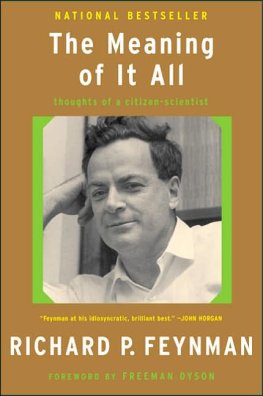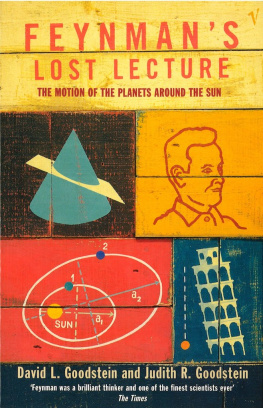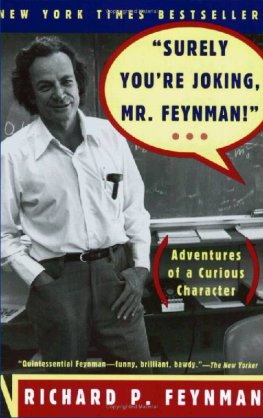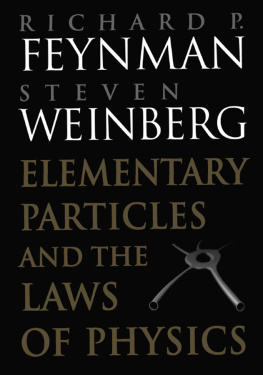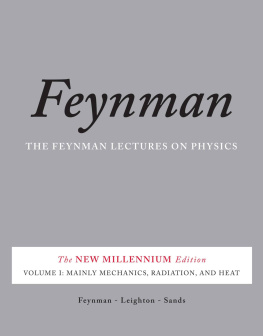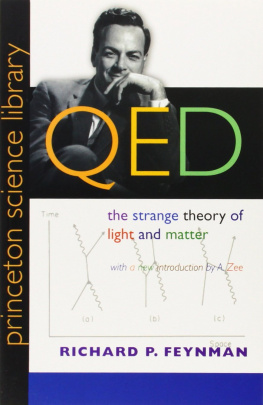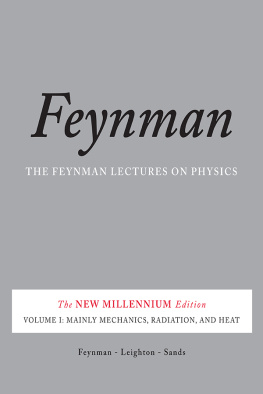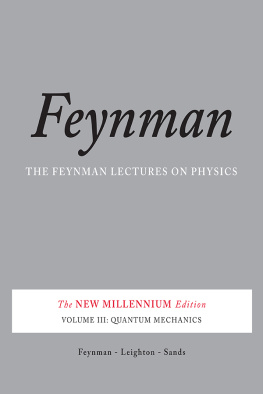Richard P. Feynman
The Meaning of It All
These lectures, given in April 1963, are published here for the first time. We are grateful to Carl Feynman and Michelle Feynman for making this book possible.
I. The Uncertainty of Science
I want to address myself directly to the impact of science on mans ideas in other fields, a subject Mr. John Danz particularly wanted to be discussed. In the first of these lectures I will talk about the nature of science and emphasize particularly the existence of doubt and uncertainty. In the second lecture I will discuss the impact of scientific views on political questions, in particular the question of national enemies, and on religious questions. And in the third lecture I will describe how society looks to meI could say how society looks to a scientific man, but it is only how it looks to meand what future scientific discoveries may produce in terms of social problems.
What do I know of religion and politics? Several friends in the physics departments here and in other places laughed and said, Id like to come and hear what you have to say. I never knew you were interested very much in those things. They mean, of course, I am interested, but I would not dare to talk about them.
In talking about the impact of ideas in one field on ideas in another field, one is always apt to make a fool of oneself. In these days of specialization there are too few people who have such a deep understanding of two departments of our knowledge that they do not make fools of themselves in one or the other.
The ideas I wish to describe are old ideas. There is practically nothing that I am going to say tonight that could not easily have been said by philosophers of the seventeenth century. Why repeat all this? Because there are new generations born every day. Because there are great ideas developed in the history of man, and these ideas do not last unless they are passed purposely and clearly from generation to generation.
Many old ideas have become such common knowledge that it is not necessary to talk about or explain them again. But the ideas associated with the problems of the development of science, as far as I can see by looking around me, are not of the kind that everyone appreciates. It is true that a large number of people do appreciate them. And in a university particularly most people appreciate them, and you may be the wrong audience for me.
Now in this difficult business of talking about the impact of the ideas of one field on those of another, I shall start at the end that I know. I do know about science. I know its ideas and its methods, its attitudes toward knowledge, the sources of its progress, its mental discipline. And therefore, in this first lecture, I shall talk about the science that I know, and I shall leave the more ridiculous of my statements for the next two lectures, at which, I assume, the general law is that the audiences will be smaller.
What is science? The word is usually used to mean one of three things, or a mixture of them. I do not think we need to be preciseit is not always a good idea to be too precise. Science means, sometimes, a special method of finding things out. Sometimes it means the body of knowledge arising from the things found out. It may also mean the new things you can do when you have found something out, or the actual doing of new things. This last field is usually called technologybut if you look at the science section in Time magazine you will find it covers about 50 percent what new things are found out and about 50 percent what new things can be and are being done. And so the popular definition of science is partly technology, too.
I want to discuss these three aspects of science in reverse order. I will begin with the new things that you can dothat is, with technology. The most obvious characteristic of science is its application, the fact that as a consequence of science one has a power to do things. And the effect this power has had need hardly be mentioned. The whole industrial revolution would almost have been impossible without the development of science. The possibilities today of producing quantities of food adequate for such a large population, of controlling sicknessthe very fact that there can be free men without the necessity of slavery for full productionare very likely the result of the development of scientific means of production.
Now this power to do things carries with it no instructions on how to use it, whether to use it for good or for evil. The product of this power is either good or evil, depending on how it is used. We like improved production, but we have problems with automation. We are happy with the development of medicine, and then we worry about the number of births and the fact that no one dies from the diseases we have eliminated. Or else, with the same knowledge of bacteria, we have hidden laboratories in which men are working as hard as they can to develop bacteria for which no one else will be able to find a cure. We are happy with the development of air transportation and are impressed by the great airplanes, but we are aware also of the severe horrors of air war. We are pleased by the ability to communicate between nations, and then we worry about the fact that we can be snooped upon so easily. We are excited by the fact that space can now be entered; well, we will undoubtedly have a difficulty there, too. The most famous of all these imbalances is the development of nuclear energy and its obvious problems.
Is science of any value?
I think a power to do something is of value.Whether the result is a good thing or a bad thing depends on how it is used, but the power is a value.
Once in Hawaii I was taken to see a Buddhist temple. In the temple a man said, I am going to tell you something that you will never forget. And then he said, To every man is given the key to the gates of heaven. The same key opens the gates of hell.
And so it is with science. In a way it is a key to the gates of heaven, and the same key opens the gates of hell, and we do not have any instructions as to which is which gate. Shall we throw away the key and never have a way to enter the gates of heaven? Or shall we struggle with the problem of which is the best way to use the key? That is, of course, a very serious question, but I think that we cannot deny the value of the key to the gates of heaven.
All the major problems of the relations between society and science lie in this same area. When the scientist is told that he must be more responsible for his effects on society, it is the applications of science that are referred to. If you work to develop nuclear energy you must realize also that it can be used harmfully. Therefore, you would expect that, in a discussion of this kind by a scientist, this would be the most important topic. But I will not talk about it further. I think that to say these are scientific problems is an exaggeration. They are far more humanitarian problems. The fact that how to work the power is clear, but how to control it is not, is something not so scientific and is not something that the scientist knows so much about.
Let me illustrate why I do not want to talk about this. Some time ago, in about 1949 or 1950, I went to Brazil to teach physics. There was a Point Four program in those days, which was very excitingeveryone was going to help the underdeveloped countries. What they needed, of course, was technical know-how.
In Brazil I lived in the city of Rio. In Rio there are hills on which are homes made with broken pieces of wood from old signs and so forth. The people are extremely poor. They have no sewers and no water. In order to get water they carry old gasoline cans on their heads down the hills. They go to a place where a new building is being built, because there they have water for mixing cement. The people fill their cans with water and carry them up the hills. And later you see the water dripping down the hill in dirty sewage. It is a pitiful thing.

